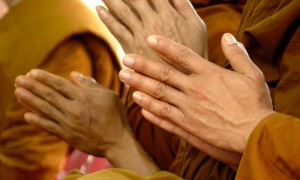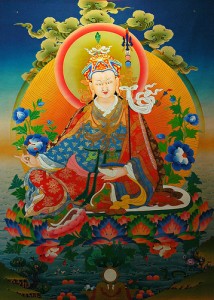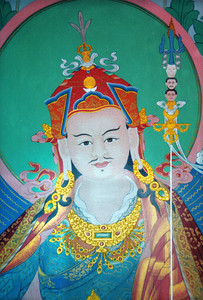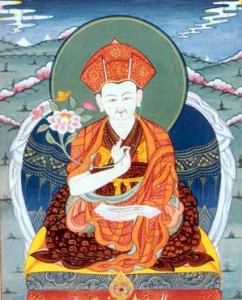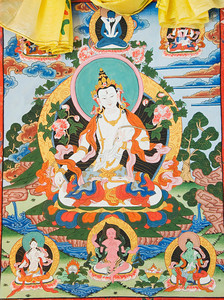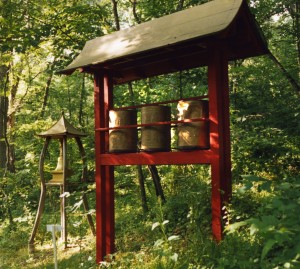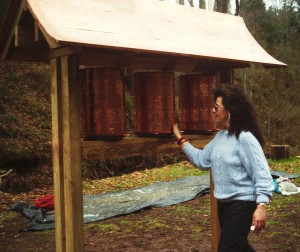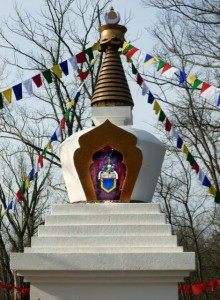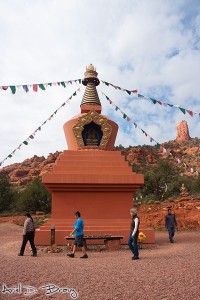An excerpt from a teaching by Jetsunma Ahkon Lhamo called Coming Alive
Back in the 1970s a number of famous healers were brought together to participate in a test. It was done in a very scientific way, and the rules were very strict. These famous people were known for their capacity to “lay on hands,” and many had a lot of clients. They had really gained a name for themselves. The researchers also got together an equal number of ordinary folks.
Then the scientists said to the famous healers, “Here’s what I want you to do. I want you to do your healing thing, whatever it is, on this glass of water and transform it into medicine. Okay?” The healers said, “Well, all right. That’s do-able.” The message is that with love all things are possible. Unfortunately, when you’re really impressed with yourself, often it’s “with me” all things are possible. But, anyway, they were told to do that.
Then the ordinary people, who had never heard about this before, who were not even that spiritual, were given some interesting common and scientific data that showed that if we have a good intention towards something, then often things get better. The researchers also explained that if you put your hands on either side of a glass of water, you can run energy through it that harmonizes it. This turns the water into medicine because it is in harmony with the body. They explained this in a very pseudo-scientific way.
So the scientists had the two groups do their stuff. The people who were not accustomed to this were asked to do the very best spiritual praying they could do. “If you have any mystical bone in your body, please apply it here,” they were told. They said, “Well, okay, if you say so,” or “Well, I’ll do my best.”
Everyone spent the appropriate amount of time. The healers did their healing thing, with all the bells and whistles; and each one of them had their particular way of doing it. One was a shaman. One was simply ‘’hands on” and so forth. The ordinary people simply put their hands together and prayed. It was reported that “you could see a lot of knit brows.” They were praying really hard. They were really trying to make this thing happen if it were possible.
I don’t remember all of the details, but some of the people, both among the healers and in the ordinary-people group, had some on-going physical or mental problems. They were divided into a subgroup where they were asked to drink their own medicine–their own water–and then report the results over a period of two days.
People who didn’t have any problems gave their medicine to other people who had problems but didn’t produce the medicine, and no one knew which group it came from. The group knew that it was water that had been prayed over, holy water, but they didn’t know any other details. So this group drank the medicine over a few days.
The results were phenomenal. A larger percent of healing, comfort, relief and benefit was reported by those who drank the water prayed over by the ordinary people. Those who drank the water prepared by the healers reported a 20 percent recognition of benefit. Those who drank the water that was prepared by ordinary people, reported a 90 percent recognition of benefit. There was a remarkable difference.
There was also another test that was done as part of this study. Although this is not mainstream science, the results are interesting. The medicine water was subjected to different kinds of energy photography. Again, the water that was purified by the nonprofessionals was filled with energy that could be photographed, whereas the water that was prepared by healers had some energy but it wasn’t anything like the remarkable level of energy in the water prayed over by the ordinary folks. Even the study participants–both the healers and the ordinary people–had to admit that when they drank some of each water, they felt more energy from the water prayed over by ordinary people.
It was a remarkable study. I think that scientists could find all kinds of ways to throw the study out of court, but I, for one, find things like that fairly convincing. The results sounded real to me.
In my experience as a teacher I have seen many students travel around, hearing more and more teachings from all the best sources sometimes obsessively, who get into what I call the ‘fat cat’ stage. The fat cat stage is where you sit back on your laurels and you say, “I know enough now about Dharma to be impressive. So I’m going to impress you.” They’ve gotten to the point where the magic is lost. The romance is over. They’re not really taking in the teachings anymore.
Often these students have a funny inner posture. When they hear the teacher, they think, “Oh I know that,” or “Yeah, I’ve heard that one before,” or “Oh yeah, that’s the teaching on such and such” or “Well, interesting that she’s teaching that teaching today. I wish she would also include X, Y, and Z fact.” If this kind of non-surprise, non-delight, non-taste, non-involvement is going on when you hear the teachings, you can be assured that not much is going on inside, not much is happening at all.
On the other hand, if you are one of the newer practitioners or at least somehow have magically managed to keep yourself in this pure posture of childlike innocence; when you hear the teachings, they’re like delicious morsels. They roll around in your mouth and in your mind and in your heart and you think, “How amazing, how delightful is this logic. How delightful is this information. How different from what I know and from what I’ve heard.” It’s like a child tasting something for the first time, such as orange juice or mashed banana. The infant rolls it around on the tongue to a point where it almost becomes foreign, incapable of being taken in. That kind of delight provides a way for the teaching to become part of oneself, part of one’s attitude, one’s mind, one’s reality, even one’s habitual tendency. It can even begin to change our habitual tendencies, because we are impacted by it. It can be used as an antidote to something that is troubling us.
The mistake we make is in thinking that the teacher is responsible for keeping our love alive, that the teacher is supposed to come up with a new and interesting way of presenting the same old data every week so that once in a while we can hear it. That really isn’t true. That’s not the teacher’s responsibility. It’s one’s own responsibility to maintain a sense of innocence.
Let’s talk about what that might look like. I would like to use some of my own personal experiences. When I was in Sedona, I went into a Sweat Lodge.
The Sweat Lodge was very traditionally run, and I was really interested in seeing what it would feel like to participate in a Sweat Lodge in a place where almost no one knew me. I knew I wouldn’t be recognized. The only one who knew who I was was the leader of the Sweat Lodge. I wanted to experience the Sweat Lodge without my Dharma community around, so that my experience would be more uncontrived, more natural, more relaxed. There is something to be said for being in a place where you’re completely anonymous and completely free to do exactly what you would do naturally as opposed to being around people who have expectations of you.
I went into the experience wondering what it was going to be like. I had two ideas. First I thought, “Well this could be really hokey! It could be chanting Indian chants I don’t know or understand, and so I would just be making meaningless noises. Or it could be that everyone has an act going on, and I don’t know what the act is. I’m just a little Buddhist girl. I don’t know anything about Indian stuff. So it could be really strange.”
On the other hand, I thought to myself, “This could be really magical. Just think about what it would be like to go into this Sweat Lodge, which traditionally is like going into a womb-like environment, almost like the womb of Mother Earth, and re-inventing yourself.” Sweat Lodges were traditionally used either to solidify one’s purpose or to completely re-invent oneself and put oneself on a new track. The idea of sweating was to let go of old toxicity–of old stuff inside of you—and then letting yourself drink new fresh water. In a sense that’s like letting go of old habitual tendencies and drinking in new purpose, aligning yourself with the four directions. This is something that is in common with Buddhist philosophy. So I thought, “This could be amazing. This could be pretty terrific.”
I went into the experience with both ideas. I placed myself in a position of neutrality and left myself really open in a very innocent way. I went there thinking, “Ultimately it doesn’t really matter if this experience is like this or like that. What matters is that I’m going into this experience with a pure intention. I really intend to cleanse myself in every way. I really intend to let go of anything old and afford myself new opportunity. I really intend to have this be in alignment with my own personal quest, which is to never fall into old habitual tendency or mindless method, but rather to constantly keep my spiritual practice new and fresh and on point. That’s my intention. That’s what I really want to do.”
The experience was really interesting in many different ways. Yes, there was chanting. Yes, it was very, very hot–hot to the point where it seemed unbearable. Because it’s so hot, people wear very little clothing. This is very different from a Dharma experience. There were many things that were different and many things that were predictable, but I found that I had exactly the kind of experience that I went in there to have. I was able to let go of something. I was thinking that this was an opportunity to reinvent myself, that is to say, to enter back into the symbolic womb of my experience and then to come forth again. And so I was determined to use that experience with a great deal of strong and purposeful intention.
In the Sweat Lodge each person has the opportunity to speak his or her prayers, hopes and dreams out loud. If you do that by rote, that could be a really tacky, cheesy experience; but if you really do that from the heart–reaching in and asking yourself sincerely what’s in there, what needs to be reinvented, what has to be done, and really rip yourself open–it could be a very profound experience. In fact, it could be a life-changing experience. You don’t need a Sweat Lodge to make such a life-changing experience, if you have the intention and purpose of truly ripping yourself open as though you were newborn.
I realized that both of these experiences were possible, and I made myself remain in this posture of innocence and really get as much from the Sweat Lodge as possible. I was really going to go for it. When it was my opportunity to say my prayers, I was a little surprised at what came out. I was surprised that I could hear myself pray like that in public again. When I pray in public, it’s in front of my students who have expectations. I’m supposed to be the leader.
There I was able to pray in public the way I really pray in my heart of hearts. I found myself crying when I was praying. I found myself begging for beings. That’s what I do when I pray. In my prayers I really reject and renounce any comfort or safety for myself, any request that might make my life better or easier. But I always go into great depth about the suffering of other sentient beings. I really think about it. I really regard it. I really beg for beings. I had the chance to do that in this wonderful environment where other people came to be supportive. When you really make an extraordinary heartfelt prayer, the Sweat Lodge leader and the other participants support you through some sort of verbal encouragement. Those who are used to the Indian tradition, say something Indian, like “Ho.” People who are not really accustomed to that kind of Indian experience will say something like “Yes, that’s right. Go on.” or “We’re with you.” The participants in the Sweat Lodge support you.
I can’t remember when I last had an experience like that in a very innocent and non-teacher way. That was really wonderful for me. I went through all of the cycles and all of the different elements. They built on themselves, and I came out of the experience really happy because I was able to approach my path that I love so much with my whole heart once again. This extraordinary, almost-newborn experience, which I and some others who were also new to Sweat Lodges had, contrasted with the experience of the older participants in Sweat Lodges. There were even a couple of times where these older participants would lean over and say, “You can lean down and escape some of the steam if you want to” or “Sometimes the fire is hotter than this.” Here I am praying my guts out with my eyeballs wrinkled and nothing left in my body to sweat out, reaching for everything I’ve got, and these other people are telling me, “Don’t worry kid, sometimes the fire’s hotter than this.” I’m thinking to myself, “Wow this is really something!”
I came out of that experience really moved, really refreshed. When I spoke to the leader of the Sweat Lodge, he said, “Well, that’s the best use of the Sweat Lodge. The Sweat Lodge is what you make it. What you’re looking for is actually within you, not within the Lodge. For you to be refreshed is to have something new, something that gives you the courage and the power to move on.”
© Jetsunma Ahkön Lhamo

